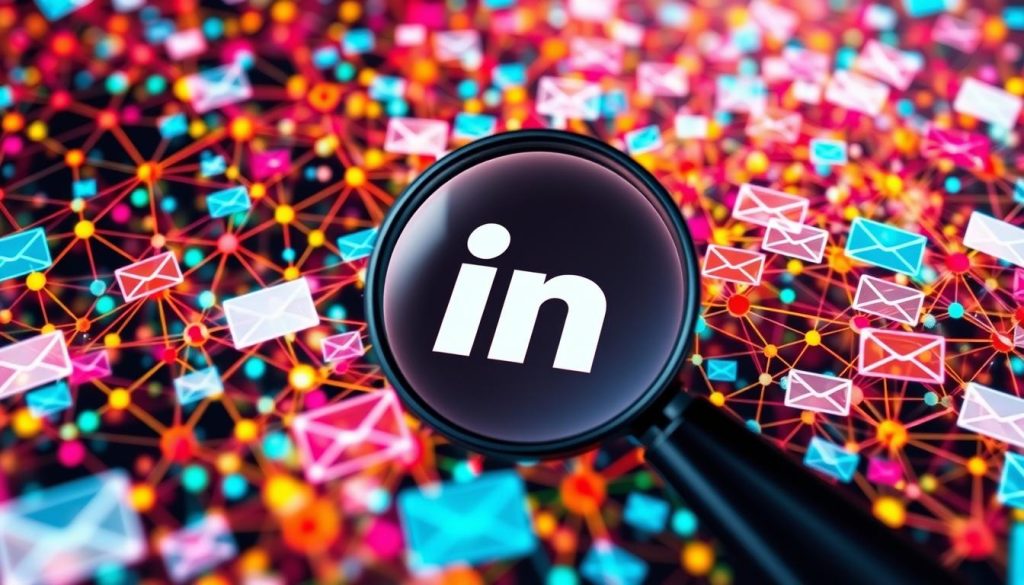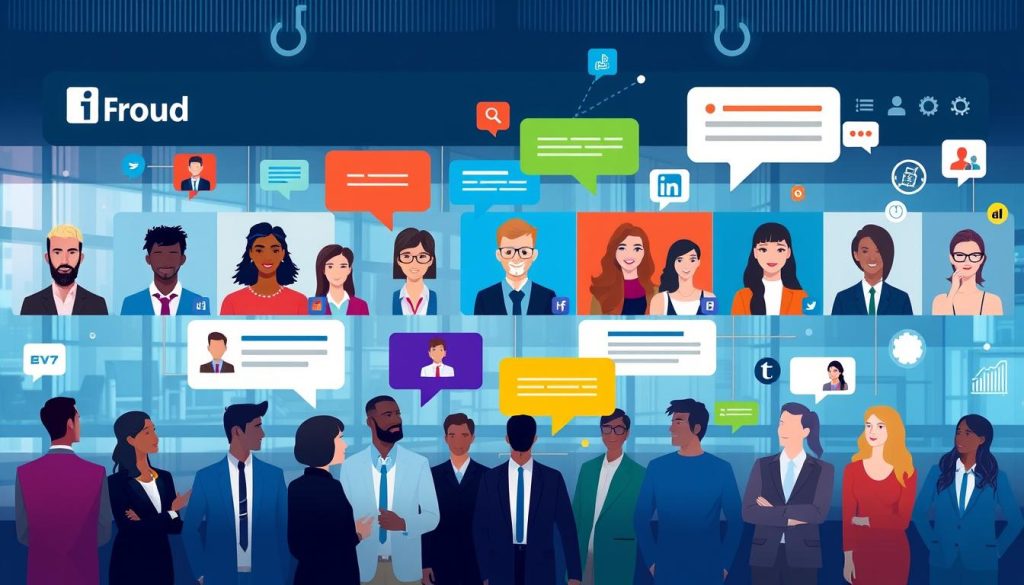In today’s world of professional networking, it’s hard to stand out. LinkedIn has become a key place to connect with others in your field. But, it’s getting crowded, making it key to find ways to reach out effectively.
This part talks about how to do cold outreach in crowded LinkedIn spaces. It gives tips and strategies to help you get noticed and make real connections. Whether you’re starting a business, selling, or want to share your ideas, knowing how to navigate LinkedIn’s crowded markets is vital.
Key Takeaways
- Understand the concept of market saturation and how it impacts your LinkedIn outreach efforts.
- Identify saturated niches and industries where competition is fierce, and learn strategies to stand out.
- Craft a compelling LinkedIn profile that showcases your unique value proposition and attracts your target audience.
- Develop a targeted outreach strategy to reach the right prospects and build meaningful connections.
- Leverage the power of personalization to make your messages stand out and increase response rates.
Understanding Saturation in LinkedIn Markets
Professionals and businesses need to think about saturation in their LinkedIn markets. Knowing about market saturation can help you stand out or get lost in the crowd.
Defining Saturation: What It Means for You
LinkedIn market saturation is about how much competition and content there is in a certain field. When a market is full, it’s hard to catch your audience’s eye. This makes it tough to break through LinkedIn noise and target your niche well.
Identifying Saturated Niches and Industries
To see if your niche is too crowded, look for these signs:
- Many active profiles and connections in your market
- Many people competing for the same audience
- A lot of content and updates in your field
- Hard time getting noticed or talking to your audience
By checking these signs, you can figure out how saturated your LinkedIn markets are. Then, you can change your niche LinkedIn targeting plans to fit.
“Understanding market saturation is crucial for professionals and businesses seeking to stand out on LinkedIn. It’s the first step in crafting a targeted outreach strategy that can help you break through the noise.”
The Importance of Cold Outreach on LinkedIn
In today’s crowded LinkedIn markets, cold outreach is key. It can open doors to opportunities that seemed impossible before. LinkedIn’s unique platform can be a powerful tool if used with care and personalization.
How Cold Outreach Can Open Doors
Cold outreach might seem scary, but it’s very effective. By researching and personalizing your messages, you can stand out. This approach can lead to new opportunities, like projects or business deals.
Benefits of Using LinkedIn for Networking
- Access to a vast, professionally-curated network of potential connections
- Ability to research and target specific individuals or companies within your industry
- Opportunity to showcase your expertise and thought leadership through content sharing
- Potential for introductions and referrals from your existing network
- Efficient and convenient way to maintain and nurture professional relationships
Using cold outreach on LinkedIn can help professionals in saturated markets. It allows them to make meaningful connections that can grow their business. But, it’s crucial to be thoughtful and careful in your approach for the best results.
Crafting the Perfect LinkedIn Profile
Your LinkedIn profile is like a digital business card. It’s key to stand out and reach your specific audience. A strong, optimized profile shows off your skills and personal brand. Let’s look at the must-haves and tips to make your LinkedIn profile shine.
Essential Elements of a Strong Profile
- A captivating, keyword-rich headline that grabs attention and communicates your value proposition
- A professional, high-quality profile picture that puts your best foot forward
- A compelling summary that highlights your unique skills, experience, and passion
- A detailed work history that demonstrates your achievements and qualifications
- Relevant, up-to-date skills and endorsements to validate your expertise
- Thought-leadership content, such as articles or posts, to showcase your industry knowledge
Tips for Optimizing Your Profile for Outreach
- Conduct thorough research to identify the keywords and phrases your target audience is searching for, and incorporate them throughout your profile
- Leverage the “Featured” section to showcase your most impressive projects, publications, or media mentions
- Encourage your network to endorse your skills and provide recommendations, as these build social proof and credibility
- Regularly update your profile to reflect your latest accomplishments and ensure it remains relevant and engaging
- Utilize the “Open to” feature to indicate your availability for new opportunities, making it easier for prospective connections to reach out
With a well-rounded, optimized LinkedIn profile, you can become a thought leader in your niche. This boosts your chances of connecting with your target audience amidst the LinkedIn noise.
Developing a Targeted Outreach Strategy
In the world of LinkedIn outreach, a targeted strategy is crucial. It helps you stand out in crowded markets. By focusing on your niche, you can make a bigger impact and boost your success rate.
Identifying Your Ideal Audience
Start by defining your ideal audience. Look for specific traits, challenges, and interests in the people you want to reach. Think about things like:
- Industry
- Job title or role
- Company size or type
- Geographic location
- Shared interests or hobbies
By narrowing your focus, you can send messages that really speak to them.
Researching Prospects Effectively
After finding your ideal audience, research them well. Use LinkedIn’s advanced search to find people who match your criteria. Look at their profiles, activities, and connections to learn more.
| Key Prospect Research Elements | Benefits |
|---|---|
| Job title and responsibilities | Understand their pain points and how your services can help |
| Company information and industry trends | Tailor your message to their specific needs and challenges |
| Shared connections and mutual interests | Leverage common ground to build rapport and personalize your outreach |
By doing deep research, you can create a strategy that really speaks to your prospects. This boosts your chances of success in saturated markets.

Personalization in Cold Outreach Messages
In the world of LinkedIn, where everyone gets lots of generic messages, being personal is key. Cold outreach needs a smart plan to stand out and really connect with people.
The Power of Personalization
Personalized messages show you care and have done your homework. They highlight what you know about the person’s needs and challenges. This approach can boost your chances of getting a reply and starting valuable talks.
Techniques for Personalizing Your Messages
- Learn about your prospect’s background, interests, and goals to make your message fit.
- Point out something specific about their work or recent wins to show you get them.
- Share insights or content that could really help them.
- Use their name naturally in your message instead of generic greetings.
- Make your subject line catchy to grab their attention and get them to open your message.
Using these personal touches in your cold outreach in saturated LinkedIn networks can help you break through the LinkedIn noise. You’ll make real connections with your prospects, making your outreach efforts more successful.
Timing Your Outreach for Maximum Impact
In the competitive world of LinkedIn, timing is key. To succeed in saturated markets or niche targeting, you need to know when to reach out. This requires a deep understanding of the best times to connect with your potential contacts.
Best Times to Send Connection Requests
When it comes to sending LinkedIn connection requests, timing is everything. Research shows the best times are:
- Early in the week, like Mondays and Tuesdays, when people are more active.
- Between 10 AM and 2 PM, when most users are online during work hours.
- Don’t send requests on weekends or late at night, as they might get lost.
By following these best practices, you can boost your chances of getting accepted. This opens the door for valuable conversations.
Follow-Up Timing: How Long to Wait
After sending a request, timing your follow-up is just as important. Experts suggest waiting 3-5 days before sending a personalized message. This gives your new connection time to accept and review your profile.
If you don’t get a response after the first follow-up, wait another 7-10 days. This shows respect and avoids being seen as too pushy.
By carefully planning your outreach and follow-ups, you can make a positive impact. This is true even in crowded markets or specific niches.
Overcoming Common Obstacles in Outreach
LinkedIn is getting busier, making cold outreach harder. You might face rejection or find it tough to get a response. But, with the right approach, you can still make a mark.
Handling Rejection Gracefully
Rejection is part of the game, but it shouldn’t stop you. Stay strong and open to change. See each rejection as a chance to get better.
Think about how you can tweak your message or who you’re reaching out to. This way, you can connect better next time.
Strategies for Re-engaging Non-responders
- Revisit your initial message and consider ways to make it more compelling or personalized.
- Try a different outreach method, such as sending a follow-up message or engaging with the prospect’s content on LinkedIn.
- Adjust the timing of your outreach, as certain days or times may be more effective for your target audience.
- Leverage LinkedIn’s advanced search features to find alternative points of connection or common interests to build rapport.
- Be persistent, but not pushy – striking the right balance is key to maintaining a professional and courteous approach.
LinkedIn can be tough, but you can beat the odds. Be strategic, adaptable, and resilient. Turn each challenge into a chance to grow and connect.
Utilizing LinkedIn Groups and Communities
In the ever-changing world of LinkedIn outreach for saturated markets, using LinkedIn groups and communities is crucial. It helps you build a strong niche LinkedIn targeting strategy. By connecting with professionals in your field, you can grow your network and gain trust. These are key for cold outreach success in competitive markets.
Finding Relevant Groups in Your Niche
Finding the right groups is key for LinkedIn outreach for saturated markets. Start by searching on LinkedIn with industry-specific keywords. Look at the group’s size, how active it is, and the quality of its discussions.
- Find groups that match your target audience and industry.
- Choose groups with lots of activity and good discussions.
- Focus on groups with a strong, engaged community.
Engaging Authentically in Group Discussions
After finding the right groups, start engaging genuinely. Don’t immediately try to sell. Instead, share valuable insights, answer questions, and contribute to discussions. This way, you become a trusted and knowledgeable resource, making your niche LinkedIn targeting and outreach more effective.
- Join in discussions, sharing your expertise and insights.
- Respond to others’ questions and comments, showing you’re engaged.
- Share relevant, high-quality content that fits the group’s interests.
Using LinkedIn groups and communities can help you succeed in saturated markets. Remember, being real and engaging is crucial for making the most of this powerful platform.

“Successful LinkedIn outreach in saturated markets requires a strategic approach that goes beyond the traditional cold message. By actively engaging with niche communities, you can establish your expertise and build trust – laying the foundation for long-term relationships and sustainable growth.”
Analyzing Your Outreach Results
When you dive into LinkedIn, it’s key to measure your cold outreach success. By tracking important metrics and using the right tools, you can learn a lot. This helps you improve your strategy and stand out in the crowd.
Key Metrics to Track Your Success
Focus on these key metrics for your LinkedIn outreach:
- Connection request acceptance rate: See how many people accept your requests to understand if you’re reaching the right audience.
- Message response rate: Find out if your messages are engaging by tracking replies.
- Conversion rate: Check how many connections turn into meaningful talks or new business.
- Engagement rate: See how people interact with your profile and messages to improve your approach.
Tools to Measure Your LinkedIn Efforts
Using the right tools makes tracking your LinkedIn outreach easier. Here are some good options:
- LinkedIn Analytics: Use LinkedIn’s built-in analytics to understand your profile and content performance.
- Third-party outreach platforms: Tools like Dux-Soup and Linked Helper can automate and measure your outreach.
- CRM integration: Connect your LinkedIn work with a CRM to track your lead nurturing process.
By watching your key metrics and using the right tools, you’ll know what’s working. This lets you fine-tune your strategy and make your voice heard on LinkedIn.
Leveraging LinkedIn Premium Features
Upgrading to LinkedIn Premium can change the game in the competitive world of LinkedIn outreach. It’s especially helpful when you’re targeting crowded markets or specific niches. With LinkedIn Premium, you can boost your outreach and stand out from the competition.
Advantages of Upgrading Your Account
One big plus of LinkedIn Premium is the advanced search filters it offers. These filters let you zero in on the most relevant prospects. You can search by job title, location, company size, and more. This ensures your messages hit the mark.
How Premium Tools Can Enhance Outreach
- InMail credits: LinkedIn Premium gives you InMail credits to reach out to people outside your network. This is key for breaking into crowded markets.
- Advanced analytics: Premium features provide deep insights into your outreach success. You can track metrics like connection rates and message responses. This helps you improve your strategy.
- Competitor insights: With LinkedIn Premium, you can see what your competitors are up to. You’ll learn about their followers, engagement, and content performance. This info helps you craft a better outreach plan.
Investing in LinkedIn Premium opens up many opportunities for better LinkedIn outreach for saturated markets and niche LinkedIn targeting. You’ll get advanced search tools and analytics to help you stand out. These features are perfect for reaching your target audience, even in the most competitive spaces.
Success Stories: Cold Outreach That Worked
LinkedIn can be tough to get noticed in, but success stories show it’s doable. They prove that cold outreach can lead to great results. These stories from different fields show how smart outreach can open doors and grow careers.
Case Studies from Various Industries
Alexis Smith, a marketing expert, used LinkedIn to reach out to big names in software. She did her homework and wrote messages that really spoke to them. This led to many important meetings and a big boost in her business.
Tyrone Johnson, an HR pro, used cold outreach to grow his network in healthcare. His efforts paid off with new insights and job chances.
Lessons Learned from Successful Outreach Campaigns
These stories teach us a lot. They show the power of knowing your audience, making messages personal, and following up. Emma Rivera, a sales pro, says it’s key to offer real value and show you care.
Michael Chen, an entrepreneur, talks about using LinkedIn’s tools to find the right people. This led to great partnerships and new ventures.
FAQ
How can I stand out with my cold outreach in a saturated LinkedIn market?
To stand out, create a strong, optimized LinkedIn profile. Develop a targeted outreach strategy and personalize your messages. Join LinkedIn groups to build credibility and connect authentically.
What are the signs of market saturation on LinkedIn, and how do I identify them?
Signs of saturation include many competitors and low engagement. Look for crowded niches by researching your industry and analyzing competitors. This helps you spot areas with too many professionals and businesses.
Why is cold outreach important in saturated LinkedIn markets?
Cold outreach is key in saturated markets. It helps you create new connections and open doors to opportunities. It’s a way to break through the noise and build meaningful relationships.
What are the essential elements of a strong LinkedIn profile for outreach in saturated markets?
A strong profile has a compelling headline and a detailed “About” section. Include relevant skills and endorsements, a good profile photo, and a clear call-to-action. Tailor your profile to your target audience and highlight your unique value.
How do I develop a targeted outreach strategy for saturated LinkedIn networks?
Start by identifying your ideal audience and their pain points. Research your prospects on LinkedIn. This helps you craft personalized messages that resonate in saturated markets.
What are the best practices for personalizing cold outreach messages on LinkedIn?
Personalize messages by referencing specific details about the recipient. Highlight shared connections or interests. Show you understand their challenges or goals. Avoid generic messages and tailor each approach.
When is the best time to send connection requests and follow-up messages on LinkedIn in saturated markets?
The best times vary by your target audience. Mid-week and early evening are often effective. Professionals are more active on LinkedIn during these times.
How can I overcome common obstacles in cold outreach, such as rejection and non-responsive prospects?
When facing rejection, respond graciously and stay positive. Reflect on how to improve your approach. Consider re-engaging with a fresh perspective. Persistence and adaptability are crucial in saturated markets.
How can I leverage LinkedIn groups and communities to support my outreach efforts in saturated markets?
Joining relevant groups can boost your credibility and engagement. Actively participate in discussions and share insights. Build relationships to establish yourself as an authority in your niche.
What metrics should I track to measure the success of my cold outreach efforts on LinkedIn?
Track connection rates, message responses, conversion rates, and engagement. Use LinkedIn analytics and CRM software to monitor your performance.
How can LinkedIn Premium features enhance my outreach strategy in saturated markets?
LinkedIn Premium offers advanced search filters, InMail credits, and analytics tools. It also lets you message non-connections, helping you reach your target prospects.


